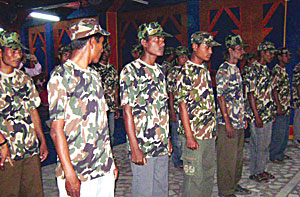 DIRGHA RAJ UPADHAYA ATTENTION: Members of the self styled Tharu Army of the Tharuhat Autonomous Council in Dhangadi recently. |
Over the past year, this has swung from anger against Kathmandu to joy after the polls, from dislike of the 'other' community to carving out an uneasy co-existence. This time, there is a palpable sense of fear, confusion and discontent even as Peace Minister Janardan Sharma visited here this week for unofficial talks with militant groups, whichthe minister insisted were secret even as details were leaked.
The broader Madhesi identity, fragile at the best of times, is under severe strain. Non-Yadav intermediate castes, importing the 'Other Backward Classes' terminology from India, were on strike for more than a week. They wanted a commission for reservations and recognition, and there was resentment against the upper castes and Yadavs for cornering all benefits.
At a seminar in the heart of Mithilanchal, there were increasingly assertive voices from locals who claimed that their language was not Matihili. Dalit radicalisation is growing steadily. A Chamar from a village near Janakpur told us: "This time, I will not go to the streets for a Madhes movement. I will only take part in a Dalit movement."
The Madhes elite are reacting to these voices in exactly the same way the hill elite reacted to Madhesi assertion: seeing conspiracies when none exist. If Pahadis saw the Madhes movement as a ploy to divide the wonderful and happy Nepali society, Brahmans and Yadavs of Madhes see this as a ploy to divide up the Tarai's political power. At the root is the failure of the Madhesi leaders to be inclusive.
The second trend is of growing political discontent. There are murmurs that Kathmandu has failed to implement past accords. But the anger against the state is based on its failure to provide security. At least a 100 people have died in the last six months, 126 have been abducted and there have been 77 blasts. The only way for a rural family to save itself from being looted or killed is to send a family member to join an armed group.
"Does the state want to create anarchy here because it discredits the Madhes movement in everyone's eyes?" asks a Janakpur trader. The plea is not for ruthless security operations, but a government that remembers its job is to protect life.
The large part of the discontent however is reserved for the Madhesi parties themselves, especially the MJF. "Upendraji forgets about Madhes in Kathmandu," they say. Or: "JP and Bijay are too busy making money. They just used us to climb up."
The big question now is which political force will capitalise on this growing disillusionment with the Madhesi outfits and the resultant political vacuum.
Various Tarai-based parties are developing new adaptive strategies. The TMLP is trying to build an organisation but can't get out of its upper caste straitjacket. The NC's rallies generate some energy but its message does not strike a chord and there is no grassroot followup. The UML is only banking on Tharus and Muslims splintering off from the Madhes umbrella.
But it is the Maoists who know Madhes remains the greatest obstacle to their plans for political consolidation. They are emphasising the class dimension. Matrika Yadav's action at Siraha was a well-thought out plan to be seen as the saviour of the landless. He is also working with some armed groups to dilute their anti-Maoist tilt, and he engineered a split in Goit's ranks recently.
The Maoists know talks will soon hit a roadblock. Their motives in reaching out could either stem from just wanting to be seen as sincere, or using the interlude to expand, or preparing the ground for aggressive security operations.
What is most striking is the pessimism that engulfs public life and private conversations in the Tarai. Everyone is disgruntled. They have given up on the state, and few believe the violence will stop. Things in Madhes will get a lot worse before they get better.



